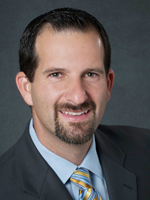A new type of school choice program aimed at serving special-needs students in Florida won bipartisan support during its first legislative committee vote Tuesday.

Rep. Michael Bileca, R-Miami, chairs the House panel that has proposed individual education accounts for special-needs students.
Several Democrats on the House Choice & Innovation Committee joined Republicans in voting 11-2 for “personal learning accounts,” a school choice option that would allow parents with disabled children to use state education funds for a range of education-related services.
Other Democrats, like Ranking Member Joe Saunders, D-Orlando, voted against the bill but held out the possibility they might support it in the future.
"Vouchers are so controversial at times, but I think that you have an honest desire to help the families that were up here today," Saunders said. "I think there's a very legitimate need."
Parents of special-needs children came to Tallahassee to testify on behalf of the proposal, while the Florida PTA and statewide teachers union objected.
Mindy Gould, the PTA's legislative chair, said the group had "great concerns," and mentioned a 2006 state Supreme Court ruling that found the state's Opportunity Scholarship program unconstitutional.
The Bush v. Holmes decision struck down the voucher program, which was created under Gov. Jeb. Bush for students in struggling schools. But justices in the case also indicated that other programs, including those for special-needs students, may be "distinguishable" under the state constitution.
Under the House legislation, individual accounts would be available to parents of children with conditions like autism and cerebral palsy who qualify for the state's two highest support levels for disabled children.
The accounts could reimburse them for specific kinds of therapy or specialized instruction for their children. Funding would be based on the formula for the state's McKay Scholarship program, also for students with disabilities.
House staff projected that in addition to students currently attending public schools, the program could be open to more than 700 current home-school or private-school students. The potential influx of new students could cost the state an estimated $8.8 million.
Supporters said the program would make better use of the money by giving parents more direct control over how it gets spent.
"The parents know best, and giving the parents the opportunity to provide the proper services to these students, I think, is just the right thing to do," said Rep. Manny Diaz, R-Hialeah. "At the end of day,” he added, “it's going to actually cost less to provide the right services in this manner than it would at a school site."
Parents participating in the program would have to provide school officials with annual evaluations of their child so the officials could track progress. The evaluations could be based on information such as state assessments, norm-referenced tests, or portfolios of their child's work.
A Senate panel also discussed its version of the proposal Tuesday, but did not take a vote.
Laura Cable, a Tallahassee mother with a special-needs son, testified in both chambers. She told the Senate Education Committee that home education worked better for her son than a traditional school environment, and that "this type of program would have benefited us greatly, just because we would have been able to help fund the resources that were there."
"Home-schooling a child with special needs is very difficult," she said. "The one thing that I would say in opposition to some others who would be opposed to this bill is that, really, the parent has the greatest desire to see the child succeed."